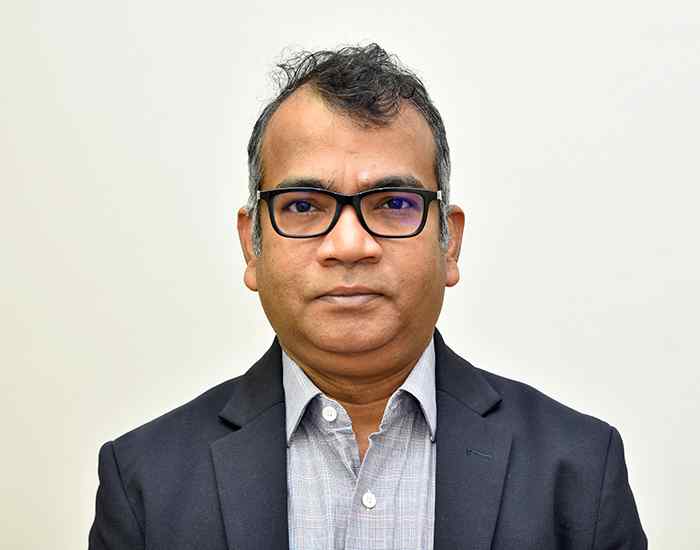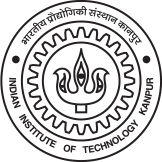
जीतेन्द्र कुमार बेरा
PhD (IISc Bangalore)
Professor, Department of Chemistry
शोध करना दिलचस्पी
Bimetallic Synergism, Small Molecule Activation, Metal-Ligand Cooperativity, N-Heterocyclic Carbene, Green Chemistry.
CL 107A/B,
Department of Chemistry
IIT Kanpur,
Kanpur 208016
विशेषज्ञता
Organometallic Catalysis
शिक्षा
PhD (1999), IISc Bangalore
चयनित प्रकाशन
Amide-Functionalized Naphthyridines on RhII-RhII Platform: Effect of Steric, Hemilability and H-Bondingon Structural Diversity and Catalytic Activity of Dirhodium(II) Complexes,Chem. Eur. J. 20, 16537 (2014).
A Highly Efficient Catalyst for Selective Oxidative Scission of Olefins to Aldehydes: Abnormal-NHC−Ru(II)Complex in Oxidation Chemistry,J. Am. Chem. Soc., 136, 13987 (2014).
Metal-Ligand Cooperation on a Diruthenium Platform: Selective Imine Formation via AcceptorlessDehydrogenative Coupling of Alcohols with Amines,Chem. Eur. J. 20, 6542 (2014)
Bulky, Spherical and Fluorinated Anion BArF Induces 'On-Water' Activity of Silver Salt for the Hydration ofTerminal Alkynes,Tetrahedron Lett. 2014, 55, 1444.
Room Temperature C–H Bond Activation on a [PdIPdI] Platform,Chem. Commun. 2013, 49, 9764.
Cyclometalations on Imidazo[1,2 a][1,8]naphthyridine Framework,Organometallics 2013, 32, 4306.
Reactions of Acids with Naphthyridine-Functionalized Ferrocenes: Protonation and Metal Extrusion,Inorg. Chem. 2013, 52, 1432.
Understanding C–H Bond Activation on a Diruthenium(I) Platform,Organometallics 2013, 32, 340.
A Non-Innocent Cyclooctadiene (COD) in the Reaction of 'Ir(COD)(OAc)' Precursor with Imidazolium Salts,Organometallics 2013, 32, 192.
Carbon Monoxide Induced Double Cyclometalation at the Iridium Centre,Organometallics 2012, 31, 5533.
पुरस्कार एवं फैलोशिप
Fellow of the Indian Academy of Sciences
Bronze medal of Chemical Research Society of India
Swarnajayanti Fellowship (DST)
Ramanna Fellowship (DST)
Member of the International Advisory Board of the XXV ICOMC (Lisbon, 2012), XXVI ICOMC(Sapporo, Japan, 2014)..
पेशेवर अनुभव
Purdue University, 1999-2001.
Texas A&M University, 2001-2003.
Assistant Professor, IIT Kanpur, 2003-2007.
Associate Professor, IIT Kanpur, 2008-2011.
Professor, IIT Kanpur, 2011 onwards.
Fellow, Indian Academy of Sciences, 2013.
Fellow, National Academy of Sciences, 2014.
वर्तमान शोध
Bera group at IIT Kanpur studies organometallic catalysts for small molecule activation and organic transformations. Towards this effort, organometallic compounds based on bimetallic constructs (M-M) are developed and their catalytic utility in organic reactions is explored. Dicopper (I), diruthenium (I) and dipalladium(I) compounds are synthesized which show excellent catalytic activity for cycloaddition, carbene transfer and C-C coupling reactions, respectively. Carefully designed experiments reveal that metal-metal cooperation influences substrate activation, guides stereoelectronic factors and promotes product elimination in the catalytic cycle. Lessons learnt from these studies are utilized to develop new-generation catalysts for conversion of cheap and abundant molecules to useful chemicals.
Another key area of research that is being developed at Kanpur includes designed catalysts featuring metal-ligand (M…L) cooperation. Carefully designed ligand scaffold which holds the metal ion and simultaneously offers proton-acceptor has been devised for bifunctional water activation. Using this principle, hydration, hydrolytic and oxidation catalysts that utilize water as a reagent is developed. The metal-ligand cooperation strategy is a simple and effective paradigm in small-molecule-activation chemistry. Importantly, it involves bifunctional substrate activation, and not necessarily oxidative addition/reductive elimination sequence, thus offering prospect for catalysts based on 3d metals. We are presently developing catalysts that employ hydroxy / hydroxide and amine / amide functionality for activation of alcohol and hydrogen respectively.
Further, we seek to understand fundamental processes involved in organometallic reactions. Activation of C-H bond has remained a favorite topic in our research. A host of experimental techniques including X-ray, NMR, GC-MS, kinetic studies, isotope labeling experiments are routinely carried out for compound characterization, and for studying reaction mechanism. Computational tools are often exploited to support proposed pathway. Through such unifying approaches, Bera group seeks to gain clear mechanistic understanding of chemical processes.Recently, we have initiated a green chemistry program to address energy, environmental and sustainability aspects of chemical synthesis.



